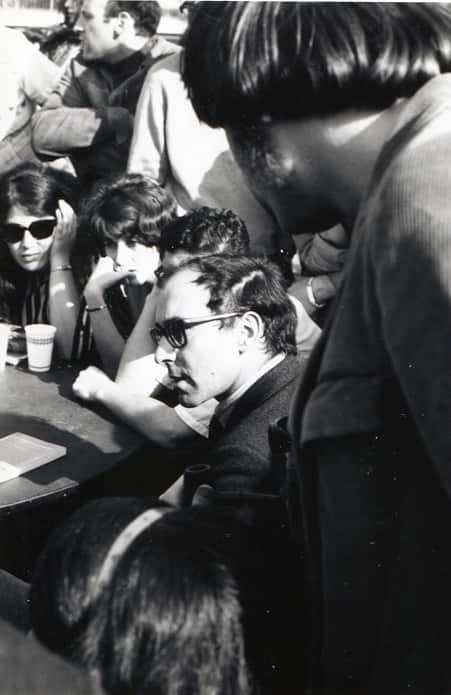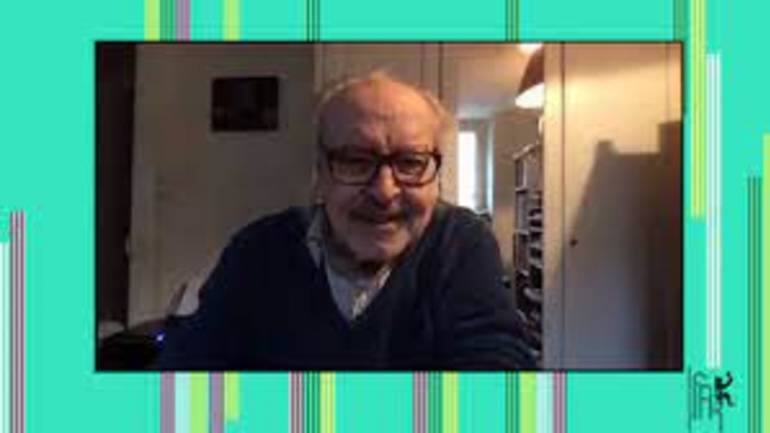



Four years ago, the Cannes film festival's competition jury headed by Australian actor Cate Blanchett presented a Special Palme d'Or to Jean-Luc Godard - the first in the famous festival's history - for what would be the celebrated French director's last film, The Image Book. A few days earlier, after the screening of the film at the festival, Godard had arrived unexpectedly in Cannes via Facetime to take part in a mandatory press conference for directors in the competition category.
Godard's Facetime appearance in Cannes came exactly 50 years after he had shut down the festival along with other filmmakers during the 1968 nationwide protests in France, kicked off by students. Sitting in his home in Switzerland and smoking a cigar, the French New Wave master, then 88, talked about the "courage to imagine" that kept him going.
Three years later, another big honour came calling, this time from the International Film Festival of Kerala (IFFK), which gave Godard a Lifetime Achievement Award during its 25th edition held in March last year.
Widely regarded the enfant terrible of modern French cinema, Godard's death was reported on Tuesday, September 13, 2022. He was 91 years old.
 Godard in 1968. (Photo: Gary Stevens via Wikimedia Common 2.0)
Godard in 1968. (Photo: Gary Stevens via Wikimedia Common 2.0)In conversation with film critic C.S. Venkiteswaran and the IFFK festival's then artistic director Bina Paul, Godard confessed to his ignorance about India and Indian cinema.
"I know nothing about India," said Godard, who never visited India. "I know a little more about the Middle East and I know very little of Africa," he added while referring to his 266-minute-long work, History of Cinema, that had no mention of Indian cinema. The absence of Indian cinema wasn't entirely Godard's fault. He had asked for Satyajit Ray's films, especially his 1958 classic, Jalsaghar (The Music Room). "I asked many people to send it," he explained. "I never received it."
Talking from his home in the middle of the Covid-19 pandemic, Godard likened coronavirus to "a form of communication" like cinema because "it needs others to survive". "We don't know much about cinema like we don't know much about the virus. The disease is part of humanity, we have to learn about the disease," added the director who wanted to make a movie before he turned 25 because he had heard Orson Welles made his first film (Citizen Kane) at the age of 25.
Also read: Jean-Luc Godard: The master who wowed audiences 24 frames a second
Godard, who was a film critic at the iconic French film magazine Cahiers du Cinema, before he became a filmmaker, set off the French New Wave with such works as Breathless (1960), Pierrot le Fou (1965) and Weekend (1967).
He always said he studied cinema, by not going to a film school, but to film libraries. “We saw films then that struck us as contemporary, even if they were a 100 years old,” he said, with his spectacles dangling from the edge of his nose, during the Cannes Facetime press conference.
His last film, The Image Book (2018), was heavily inclined towards editing, not actual shooting, something filmmakers, including in India, began to rely on more during the pandemic when shooting and production facilities had to be shut down. "I quickly understood what was most important is not what we call the actual shooting but the editing, and the editing comes first. Filming is a sort of post-production, in fact," Godard explained.
 Jean-Luc Godard addressing a press conference at the Cannes 2018 festival on Facetime.
Jean-Luc Godard addressing a press conference at the Cannes 2018 festival on Facetime.In Cannes, Godard also elaborated on his famous statement that a film had “a beginning, a middle and an end, but not necessarily in that order”. "It was to go against (Steven) Spielberg and others who said there has to be a story with a beginning, a middle, and an end. So, as a joke, I said to them that things shouldn’t be in that order. There can be these three components but in a different order. Of course, I didn’t make this a real battle horse."
The Image Book, which focuses on the political situation in Europe and the Middle East, followed Godard’s Goodbye to Language (2014), an experimental work in 3D, and Film Socialisme (2010), on the state of Communism in the world. The Image Book had a fairy tale-like production process, with a Swiss NGO coming in with its support after the original French producer gave up on the movie. And the film's dependence on sound more than picture gave it a new cinematic language.
 Jean-Luc Godard in an online conversation during the IFFK award event.
Jean-Luc Godard in an online conversation during the IFFK award event.Along with Godard's new thinking on sound and images came his imagination of new exhibition spaces for films. "I think that there are things that a text or language cannot convey. The voice is not the same as speech, and speech is not necessarily language," Godard said while underlining it would make more sense to show the film in a café rather than a cinema. "A perfect screening would be in a café instead of on a TV screen. You’d see the film as a silent film and then the sound would come from here and there from a loudspeaker and suddenly the person sitting in the café would realize that the sound and the images go together."
Godard's philosophy of dialogue between sound and images in a movie is an extension of the creative thinking of artists long before the arrival of cinema. "Light is very important in impressionism. What the impressionists brought into art is light, and then (Paul) Cézanne brought colour, and colour has something to do with speech."
During his online conversation at the IFFK award event, Godard sounded concerned about distribution dominating production in the film industry today. "Production was the main element of cinema earlier. Today it is distribution, distribution serves the audience, not production."
Discover the latest Business News, Sensex, and Nifty updates. Obtain Personal Finance insights, tax queries, and expert opinions on Moneycontrol or download the Moneycontrol App to stay updated!
Find the best of Al News in one place, specially curated for you every weekend.
Stay on top of the latest tech trends and biggest startup news.